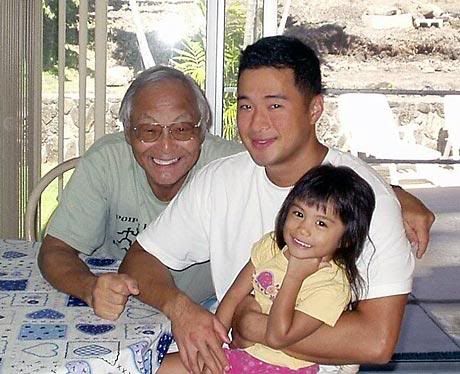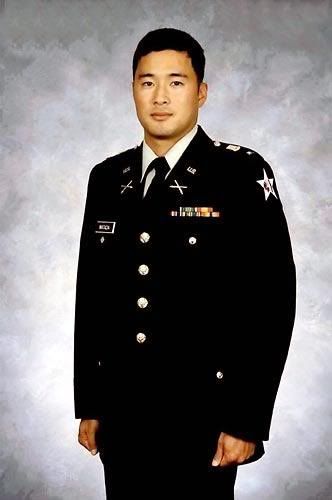True American Military Hero
Posted: June 8th, 2006, 2:53 pm
the honorable Refusenik movement reemerges in the U.S. army
-----------------------------------------------------------------------------
AMY GOODMAN: First Lieutenant Watada joins us now on the phone from Washington State. We welcome you to Democracy Now!
EHREN WATADA: Thank you.
AMY GOODMAN: We are also joined by the phone by your lawyer in Washington State, Legrand Jones. We welcome you as well.
LEGRAND JONES: Thank you.
AMY GOODMAN: Well, First Lieutenant Ehren Watada, can you talk about how you arrived at this decision -- when did you join the army?
EHREN WATADA: I signed the papers to join the military in March 2003.
AMY GOODMAN: Right at the time of the invasion.
EHREN WATADA: Yes.
AMY GOODMAN: And what was your understanding at the time of what would happen?
EHREN WATADA: In terms of the war, I knew that it was probable, more than likely, that I would be deployed to Iraq. At the time I didn't believe that the war was fully justified. But I think, like millions of people out there, I believed it when the President and many of his deputies told the world, told the U.S., that weapons of mass destruction did exist, that Saddam had ties to 9/11, he had ties to Al Qaeda, and that he had the willingness to use his weapons to attack his neighbors and also the U.S. And so at that time I had no reason to believe that the President would betray the trust of his people, and so I said that we should give him the benefit of the doubt.
AMY GOODMAN: How have you changed over this three years?
EHREN WATADA: When I learned that I was going to be deployed last year, I thought it was my responsibility as an officer to learn everything I could about war in general. Its effects on people, its effects on the soldiers. And also specifically why we were there, what was occurring at that time, what had occurred in the past. In order to get a better understanding, as was my job. And the more I read different articles by international and Constitutional law experts, and reports coming out from government agencies and non-governmental agencies, and the reports and the revelations from independent journalists and the Iraqi people themselves and the soldiers coming home, I came to the conclusion that the war and what we're doing over there is illegal. And so, being so, I felt it was my duty to morally and also legally refuse any orders to participate in it.
AMY GOODMAN: What has been the response now of the army? This week at Fort Lewis, right before your news conference, they started to crack down. They called you into a meeting?
EHREN WATADA: Right, I think as soon as they got word that I was going to make a public statement. That was the first time the Brigade Commander came out here to talk to me. Since I had submitted a letter of resignation citing my beliefs and my intent to refuse any orders to participate in an illegal war, they wanted basically to talk to me and see how strongly I held my beliefs. He said that he was fairly convinced. Also he wanted to talk to me about making a public statement and that he advised strongly against it. But if I was going to do it, then he had to lay out certain rules. So that was the first time that he had talked to me, first time I was giving out any kind of orders concerning making a public statement.
AMY GOODMAN: What is the penalty you face right now?
EHREN WATADA: Probably the maximum penalty I face, when I refuse orders to board the plane to go to Iraq, would be anywhere from two to five years, maybe more, in a military stockade. Dishonorable discharge and loss of all pay and allowances. There could be other punishment.
AMY GOODMAN: I was wondering, Army Lieutenant Ehren Watada, what your response was to the protest that resulted in I think something like 22 arrests in Olympia, Washington this past week as peace activists tried to stop a ship from moving out of port with striker vehicles and troops.
EHREN WATADA: I think that we all have a duty as American citizens for civil disobedience, and to do anything we can within the law to stop an illegal war.
AMY GOODMAN: Legrand Jones, you are First Lieutenant Ehren Watada's lawyer. What happens next? What does he face? What does he have to watch out for?
LEGRAND JONES: First off, I would like to clarify that Eric Seitz of Honolulu, Hawaii is Lieutenant Watada's primary counsel. We are with a firm in Olympia, Washington, near Fort Lewis. We're offering to assist in any way we can while his lawyer is not in town.
AMY GOODMAN: And so what are the stakes right now?
LEGRAND JONES: As Mr. Watada said, he's looking at a potential incarceration. That period of time is kind of up in the air. At this point the ball has been put in the Army's court. We hope that a meeting of the minds can occur. If not, I know that Mr. Seitz and my firm are ready, willing and able to defend him in this fight and we're honored to assist him.
AMY GOODMAN: How much support are you getting, Lieutenant Ehren Watada, in your unit?
EHREN WATADA: Very little. Of course, as you can probably understand, anybody who supports me personally would probably not voice that out loud. The majority of people I think within my unit and maybe within the military as a whole do not support my beliefs. Even if they did, they would probably not voice it publicly if they were still on active duty.
http://www.democracynow.org/article.pl? ... 08/1418206
-----------------------------------------------------------------------------
AMY GOODMAN: First Lieutenant Watada joins us now on the phone from Washington State. We welcome you to Democracy Now!
EHREN WATADA: Thank you.
AMY GOODMAN: We are also joined by the phone by your lawyer in Washington State, Legrand Jones. We welcome you as well.
LEGRAND JONES: Thank you.
AMY GOODMAN: Well, First Lieutenant Ehren Watada, can you talk about how you arrived at this decision -- when did you join the army?
EHREN WATADA: I signed the papers to join the military in March 2003.
AMY GOODMAN: Right at the time of the invasion.
EHREN WATADA: Yes.
AMY GOODMAN: And what was your understanding at the time of what would happen?
EHREN WATADA: In terms of the war, I knew that it was probable, more than likely, that I would be deployed to Iraq. At the time I didn't believe that the war was fully justified. But I think, like millions of people out there, I believed it when the President and many of his deputies told the world, told the U.S., that weapons of mass destruction did exist, that Saddam had ties to 9/11, he had ties to Al Qaeda, and that he had the willingness to use his weapons to attack his neighbors and also the U.S. And so at that time I had no reason to believe that the President would betray the trust of his people, and so I said that we should give him the benefit of the doubt.
AMY GOODMAN: How have you changed over this three years?
EHREN WATADA: When I learned that I was going to be deployed last year, I thought it was my responsibility as an officer to learn everything I could about war in general. Its effects on people, its effects on the soldiers. And also specifically why we were there, what was occurring at that time, what had occurred in the past. In order to get a better understanding, as was my job. And the more I read different articles by international and Constitutional law experts, and reports coming out from government agencies and non-governmental agencies, and the reports and the revelations from independent journalists and the Iraqi people themselves and the soldiers coming home, I came to the conclusion that the war and what we're doing over there is illegal. And so, being so, I felt it was my duty to morally and also legally refuse any orders to participate in it.
AMY GOODMAN: What has been the response now of the army? This week at Fort Lewis, right before your news conference, they started to crack down. They called you into a meeting?
EHREN WATADA: Right, I think as soon as they got word that I was going to make a public statement. That was the first time the Brigade Commander came out here to talk to me. Since I had submitted a letter of resignation citing my beliefs and my intent to refuse any orders to participate in an illegal war, they wanted basically to talk to me and see how strongly I held my beliefs. He said that he was fairly convinced. Also he wanted to talk to me about making a public statement and that he advised strongly against it. But if I was going to do it, then he had to lay out certain rules. So that was the first time that he had talked to me, first time I was giving out any kind of orders concerning making a public statement.
AMY GOODMAN: What is the penalty you face right now?
EHREN WATADA: Probably the maximum penalty I face, when I refuse orders to board the plane to go to Iraq, would be anywhere from two to five years, maybe more, in a military stockade. Dishonorable discharge and loss of all pay and allowances. There could be other punishment.
AMY GOODMAN: I was wondering, Army Lieutenant Ehren Watada, what your response was to the protest that resulted in I think something like 22 arrests in Olympia, Washington this past week as peace activists tried to stop a ship from moving out of port with striker vehicles and troops.
EHREN WATADA: I think that we all have a duty as American citizens for civil disobedience, and to do anything we can within the law to stop an illegal war.
AMY GOODMAN: Legrand Jones, you are First Lieutenant Ehren Watada's lawyer. What happens next? What does he face? What does he have to watch out for?
LEGRAND JONES: First off, I would like to clarify that Eric Seitz of Honolulu, Hawaii is Lieutenant Watada's primary counsel. We are with a firm in Olympia, Washington, near Fort Lewis. We're offering to assist in any way we can while his lawyer is not in town.
AMY GOODMAN: And so what are the stakes right now?
LEGRAND JONES: As Mr. Watada said, he's looking at a potential incarceration. That period of time is kind of up in the air. At this point the ball has been put in the Army's court. We hope that a meeting of the minds can occur. If not, I know that Mr. Seitz and my firm are ready, willing and able to defend him in this fight and we're honored to assist him.
AMY GOODMAN: How much support are you getting, Lieutenant Ehren Watada, in your unit?
EHREN WATADA: Very little. Of course, as you can probably understand, anybody who supports me personally would probably not voice that out loud. The majority of people I think within my unit and maybe within the military as a whole do not support my beliefs. Even if they did, they would probably not voice it publicly if they were still on active duty.
http://www.democracynow.org/article.pl? ... 08/1418206


